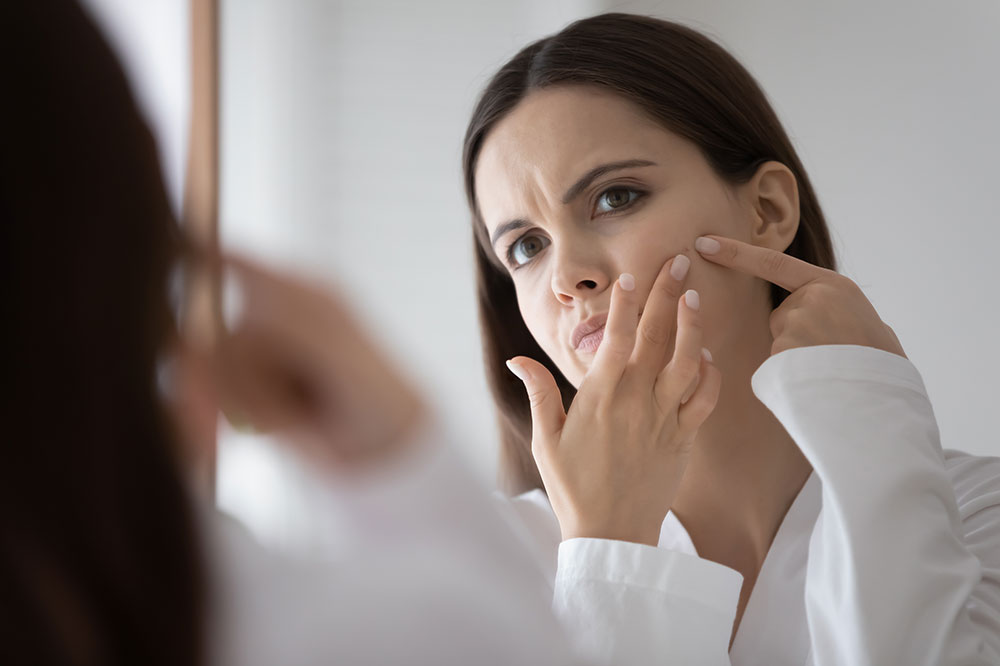
7 signs of unhealthy skin that need attention
Skin is the largest organ of the human body and often also the one that is easily ignored. It is one of the telltale organs which show signs and symptoms of how a person’s body is doing internally – if it is healthy or unhealthy. Many internal and external factors contribute to the skin’s health and here are some signs that indicate one’s skin might need some love, care, and attention.
Dry and flaky skin
This happens when there is not enough moisture retention in the skin. There can be many factors that cause dryness, including using harsh face and body cleansers, excessive bathing and exfoliation, and extreme weather conditions like too hot or too cold temperatures. Moreover, other underlying conditions like eczema or psoriasis could be responsible for the dry and flaky skin symptoms. It is important to moisturize regularly and drink enough water to stay hydrated. If one lives in an extremely dry environment, then investing in a humidifier is recommended to avoid further skin issues.
Acne breakouts
This is a prevalent condition that leads to the formation of other issues like blackheads, whiteheads, and pimples. When there is excess sebum production, then it leads to clogging of pores and the formation of bacteria. There could also be some hormonal imbalance issues that can lead to acne breakouts. It is important to follow a good skincare ritual on a daily basis to help control the condition. One must speak to a dermatologist to understand the skin’s needs and use the right products to manage the condition.
Redness and irritation
When the skin is sensitive or inflamed, it can lead to redness and irritation. However, there can be some other contributors like environmental factors, allergies, harsh chemical products, or even conditions like rosacea that can lead to such symptoms. Many dermatologists suggest using gentle products that do not have any fragrance and also recommend using sunscreen on a daily basis to avoid any damage from sun exposure. It is important to understand one’s skin type and use products accordingly.
Uneven skin tone
Commonly known as hyperpigmentation, this is one of the most common signs of unhealthy skin. It happens due to the overproduction of melanin, which is a natural pigment that forms in the body and is responsible for skin color. There are some reasons why uneven skin tone affects certain people and that could include certain injuries, hormonal changes, acne scars, or even long and frequent sun exposure. There are some professional treatments available to help with this discoloration, but one must always use sunscreen on a daily basis and also wear long-sleeved clothing when exposed to the sun to avoid sunburn.
Rash or hives
There can be several reasons why one’s skin may break out in a rash or hives, including anxiety. It is always important to speak to a dermatologist to understand why this happens and what could be the possible management tips for the condition. There can be times when one’s skin comes in contact with an allergic substance, it could be a plant or a product, and their skin responds to it by breaking out in a rash; this is the body’s way of warning one to stay away from the allergen. However, sometimes rashes are a symptom of diseases like Lyme disease, so it is essential to consult with a dermatologist and get a proper diagnosis in case this happens frequently.
Excessive oiliness
The natural oil that is produced in the skin is absolutely essential for keeping it moisturized and healthy. However, an excessive amount of oil production can lead to oiliness that can create complications. This can contribute to clogged pores, greasy appearance, and also acne breakouts. Using gentle face and body washes and exfoliating regularly are recommended to balance out the oil production. Some people experience excess oil production on the scalp as well, and this leads to the need to shampoo more often than usual.
Loss of elasticity
Losing elasticity is normal as one grows old, but if one sees an unusual increase in loss of elasticity and sagginess, then it is time to visit the dermatologist to understand the underlying issue. Age is a contributing factor in this condition; however, there are other factors that can be controlled like sun exposure, food habits, and lifestyle choices. Regular exercise and nutritious meals are important in keeping the elasticity of the skin intact, so one must speak to a doctor to understand what measures can be taken to prevent this sign of unhealthy skin.